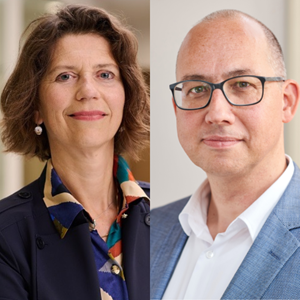Prof. Brigit Toebes and Prof. Marc Hertogh receive MSCA Doctoral Networks funding

Brigit Toebes (Professor of Health Law in a Global Context) and Marc Hertogh (Professor of Law and Society), both members of our faculty, have been awarded funding from the Marie Sklodowska Curie (MSCA) Doctoral Networks. With this funding, they will implement interdisciplinary doctoral programs and appoint PhD candidates.
INTEGRATE
Toebes has been awarded funding for the research project 'Interdisciplinary Network for Training, Education, and Growing Research into Applications of and Therapeutic Expertise around Psychedelics' (INTEGRATE). She will be working on this project with colleagues from Groningen (UMCG and UG) and colleagues from Berlin, Athens, Stockholm, Copenhagen, and elsewhere.
INTEGRATE aims to investigate the complex challenges associated with the use of psychedelics for therapeutic purposes (Psychedelic Therapies). By establishing a robust European network, future leaders in the field of Psychedelic Therapies will be trained. INTEGRATE aims to provide these future leaders with the knowledge and tools they need to promote, achieve, and ensure the safe, responsible, ethical, and sustainable integration of Psychedelic Therapies into mental health care.
SOCIAL
Hertogh has been awarded funding for the research project 'Sociology of Authoritarian Law: Insights from Central Asia' (SOCIAL). He will be working on this project with colleagues from Lund, Bristol, Berlin, Toronto, and other locations.
SOCIAL aims to study the complex interplay between law, society, and governance in authoritarian contexts in Central Asia. The findings should provide strategies to support political reform and institutional strengthening in Central Asia and beyond. SOCIAL will bring together 17 doctoral candidates (including one at the University of Groningen), all of whom will obtain their PhDs at one of the 14 universities in Europe and Canada that are part of the consortium.
MSCA Doctoral Networks
MSCA Doctoral Networks run doctoral programs. They do this through partnerships with universities, research institutions, companies, and other organizations. The doctoral programs must meet needs in various research and innovation areas and offer the researchers involved competencies and skills that are relevant for long-term employability.
The University of Groningen has achieved excellent results in this round of MSCA Doctoral Networks. No fewer than 12 projects have been funded and 13 principal investigators are involved as coordinators (4), beneficiaries (7), and associates (2).
| Last modified: | 17 April 2025 10.36 a.m. |
More news
-
15 April 2025
The Faculty of Law launches podcast The Right to News
On 16 April 2025, the Faculty of Law at the University of Groningen will launch the first episode of its podcast The Right to News (in Dutch: Recht op Nieuws). The theme of the first episode is: “Can the government just ban organizations in the...
-
14 April 2025
12 Marie Sklodowska Curie Doctoral Networks for the University of Groningen
The University of Groningen has achieved very good results in the last round of Marie Sklodowska Curie Doctoral Networks.
-
05 March 2025
Women in Science
The UG celebrates International Women’s Day with a special photo series: Women in Science.
